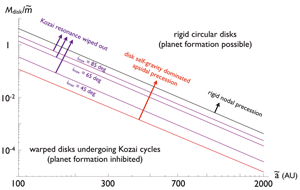- Details
- Published on 09 August 2011
Vol. 533
In section 10. Planets and planetary systems
Formation and evolution of planetary systems in presence of highly inclined stellar perturbers

For planets in binary systems, the presence of an inclined distant companion can lead to a rise in the inclination and eccentricity of the planetary orbit through the so-called Kozai mechanism. While this appears to explain at least a fraction of the systems known today, this mechanism also poses a threat to any formation of these planets: Planetesimals subject to the same Kozai process would encounter one another at high velocities and destroy themselves, turning into dust rather than accrete to form a planet. Batygin et al. have found a solution to this problem. When the disk of planetesimals is of sufficient mass compared to that of the binary companion and its orbital distance (see figure), its self-gravity dominates the apsidal precession induced by the companion. Planets are thus able to form even in the presence of a perturbing stellar companion, as long as the protoplanetary disk from which they are born is massive enough.


